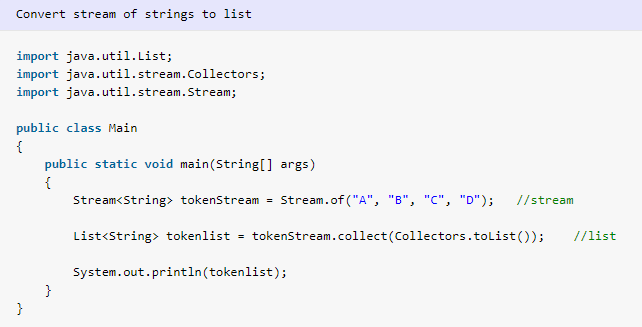Learn to collect the items from a Stream into a List using different ways in Java. We will compare these different techniques so we can decide the best way for any kind of scenario.
| Method | List Attributes | Java Version |
|---|---|---|
| List<T> list = stream.toList(); | Unmodifiable List | Java 16+ |
| List<T> list = stream.collect(Collectors.toUnmodifiableList()); | Unmodifiable List Stream cannot have null values | Java 10+ |
| List<T> list = stream.collect(Collectors.toList()); | Modifiable List | Java 8+ |
| LinkedList<T> list = stream.collect(Collectors.toCollection(LinkedList::new)); | Mutable LinkedList | Java 8+ |
| ArrayList<T> list = stream.collect(Collectors.toCollection(ArrayList::new)); | Mutable ArrayList | Java 8+ |
1. Different Ways to Collect Stream Items into List
There are primarily three ways to collect stream items into a list. Let’s compare them.
1.1. Stream.toList()
- The toList() method has been added in Java 16. It is a default method that collects the stream items into an unmodifiable List.
- The returned list is an implementation of
Collections.unmodifiableList(new ArrayList<>(Arrays.asList(stream.toArray())))wherestreamrepresents the underlying Stream of items. - The order of the items in the list will be same as the order in stream, if there is any.
- As the returned List is unmodifiable; calls to any mutator method will always cause
UnsupportedOperationExceptionto be thrown. - It is a terminal operation.
Stream<String> tokenStream = Stream.of("A", "B", "C", "D");
List<String> tokenList = tokenStream.toList();1.2. Stream.collect(Collectors.toUnmodifiableList())
- This method has been added in Java 10. It is a terminal operation that collects the stream items into an unmodifiable List.
- The returned list is an instance of
Collections.unmodifiableList()that is filled with stream items using JDK internal APIs able to access private methods of the JDK classes without using the reflection. In this case, the unmodifiable list is an implementation of SharedSecrets.getJavaUtilCollectionAccess().listFromTrustedArray(list.toArray()) where thelistis an intermediate and mutable list of stream items. - The List does not allow the null values and the whole operation will throw the
NullPointerExceptionif there is a null value in the stream. - The order of items in the list is the same as the order of items in the stream, if there is any.
Stream<String> tokenStream = Stream.of("A", "B", "C", "D");
List<String> tokenList = tokenStream.collect(Collectors.toUnmodifiableList());1.3. Stream.collect(Collectors.toList())
- This method has been added in Java 8, along with the original Stream API. It is a terminal operation that collects the stream items into a mutable List.
- The returned list is an instance of
ArrayListclass. - Similar to other versions, the order of the items in the mutable list will be same as the order in stream, if there is any.
Stream<String> tokenStream = Stream.of("A", "B", "C", "D");
List<String> tokenList = tokenStream.collect(Collectors.toList());2. Collecting Stream into LinkedList
Use the Collectors.toCollection(LinkedList::new) API along with Stream.collect() API for collecting the Stream items into a LinkedList.
Stream<String> tokenStream = Arrays.asList("A", "B", "C", "D").stream();
List<String> tokenList = tokenStream
.collect(Collectors.toCollection(LinkedList::new));3. Filtering a Stream and Collect Items into a List
Sometimes we need to find only specific items from the Stream and then add only those items to List. Here, we can use Stream.filter() method to pass a predicate that will return only those items which match the given pre-condition.
In the given example, we are filtering all employees whose salary is less than 400. Then we are collecting those employees into a List.
Stream<Employee> employeeStream = Stream.of(
new Employee(1, "A", 100),
new Employee(2, "B", 200),
new Employee(3, "C", 300),
new Employee(4, "D", 400),
new Employee(5, "E", 500),
new Employee(6, "F", 600));
List<Employee> employeeList = employeeStream
.filter(e -> e.getSalary() < 400)
.collect(Collectors.toList());4. Collect Items from Infinite Stream into List
To convert an infinite stream into a list, we must limit the stream to a finite number of elements. Given example will work in the case of a stream of primitives.
IntStream infiniteNumberStream = IntStream.iterate(1, i -> i+1);
List<Integer> integerlist = infiniteNumberStream.limit(10)
.boxed()
.collect(Collectors.toList());5. Conclusion
In this tutorial, we learned the different ways to work with streams and collect the stream items in a List.
As a general guideline, we can use Stream.toList() for unmodifiable lists, and use the Stream.collect(Collectors.toList()) for modifiable lists.
To collect items in any other List types, we must use the Stream.collect(Collectors.toCollection(LinkedList::new)) version of the solutions.
Happy Learning !!


Comments